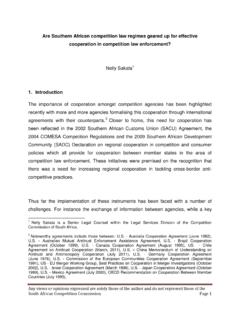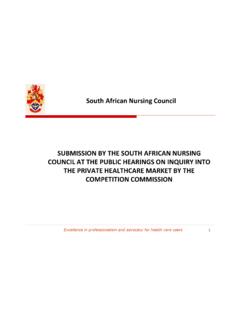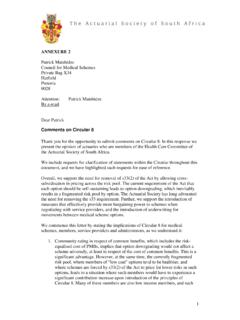Transcription of the competition act
1 1the competitionact:an introductioncompetitioncommission3pagePR EFACE: THE PURPOSE OF THIS BROCHURE3 INTRODUCTION: A WORD FROM THE COMMISSIONER4 CHAPTER 1: WHAT IS THE competition ACT?5 Definitions, interpretation, purpose & application of the actCHAPTER 2: WHAT PRACTICES DOES THE ACT REGULATE?6 Prohibited practices & exemptionsCHAPTER 3: WHAT DOES THE ACT SAY ABOUT MERGERS?10 Merger controlCHAPTER 4: WHO ADMINISTERS THE ACT?14 The competition Commission, Tribunal & Appeal CourtCHAPTER 5: HOW ARE COMPLAINTS INVESTIGATED?16 Investigation and adjudication proceduresCHAPTER 6: HOW IS THE competition ACT ENFORCED?18 Remedies, enforcement & penaltiesCHAPTER 7: IS THERE ANYTHING ELSE I NEED TO KNOW?22 General provisions & contact detailsAPPENDIX A:APPLICATION OF THE ACT IN DETAIL23 APPENDIX B:ADMINISTRATIVE FINESGLOSSARY OF TECHNICAL TERMS25competitioncommissionof south africatable of ContentsrecogniseThepeople of south africa competitioncommission That apartheid and other discriminatory laws and practices of the past resulted in excessive concentrations of ownership and control within the national economy, inadequate restraints against anti-competitive trade practices, and unjust restrictions on full and free participation in the economy by all south Africans That the economy must be open to greater ownership by a greater number of south Africans That credible competition law, and effective structures to administer that law, are necessary for an efficient, functioning economy That an efficient, competitive economic environment, balancing the interests of workers, owners and consumers andfocused on development, will benefit all south AfricansIN ORDER TO.
2 Provide all south Africans equal opportunity to participate fairly in the national economy; achieve a more effective and efficient economy in south africa ; provide for markets in which consumers have access to, and can freely select, the quality and variety of goods andservices they desire; create greater capability and an environment for south Africans to compete effectively in international markets; restrain particular trade practices which undermine a competitive economy; regulate the transfer of economic ownership in keeping with the public interest; establish independent institutions to monitor economic competition ; and give effect to the international law obligations of the Republic. Preamble to the competition Act (No. 89 of 1998)1competitioncommissioncompetitionco mmission3 This brochure is specifically designed as an explanatory guide to the competition Act itself. It is intended for the use of com-panies and their advisors. Its structure broadly follows that of the Act - unpacking each chapter and clarifying the core con-tent and the legal and commercial implications of each of these is not, of course, an exhaustive legal reference manual - nor is it a substitute for the Act.
3 The three competition authori-ties, the competition Commission, the competition Tribunal and the competition Appeal Court, preside over the finalinterpretation of the law. The brochure is therefore intended to assist companies in obtaining a better understanding of howthe Act may or may not affect their of the objectives of the Compliance Division of the competition Commission is to provide appropriate information mate-rials to enable companies to comply with the Act and consequently act within the law. Along with the CompetitionCommission s general introductory brochure - also available from the Compliance Division - this more detailed guide will bethe first in a series of brochures covering key competition Act is relatively new and, accordingly, we urge anyone in doubt about whether they may be affected by the legislationto seek legal advice or to consult the Compliance Division at the competition Commission for advice or clarification.
4 Contactdetails are given on page purpose of this brochureThe new competition Act, which became law in 1998, has a major influence on how we do business in south africa . The Actwill make sure that the way that businesses compete with each other is as fair as possible. Consequently, it plays an impor-tant role in the Government s economic policy . It creates a framework within which companies can compete against eachother, both locally and internationally - something which will ultimately benefit us all through increased product choice andlower new competition Act (No. 89 of 1998), which replaces the old Act of 1979, also seeks to create an environment wherebusiness is opened up to greater ownership by all south Africans. Consequently, it is designed to remove some of the bar-riers that previously made it difficult to start and run a business successfully. The Act also supports the Government spromise to promote small business - something that will create more jobs and ensure the country s long-term growth trust that the brochure will be of assistance to word from the CommissionerAdv Menzi SimelaneCommissioner, competition Commissioncompetitioncommission51 The competition Act s main aim is to create a fair and efficient econ-omy for all.
5 This supports the Act s commitment to equal opportuni-ty for business people, whatever the size of their business. One ofthe main ways it does this is to respond to complaints about illegalbusiness practices. This includes investigating complaints aboutsuch and above this, the competition Act has six specific objectives: to build the south African economy to provide south Africans with fair, competitive prices and product choice to create jobs and improve the lives of all south Africans to increase opportunities for south African business to compete internationally to make sure that small and medium-sized businesses have a fair and equitable chance of operating in the local economy to promote a greater spread of business ownership, in particular to include historically disadvantaged the competition Act?More practically, the Act provides for the establishment of threeinstitutions: the competition Commission, the competition Tribunaland the competition Appeal Court.
6 The competition Commission isan independent body responsible for the investigation, control andevaluation of certain business activities. These activities includerestrictive business practices; abuse of dominant position in a mar-ket; and mergers and acquisitions. The competition Tribunal andthe competition Appeal Court make judgments about these activi-ties. The activities and the three bodies that oversee them will bediscussed in greater detail later in this for the application of the Act, it applies to all economic activitywithin, or having an effect within, the Republic - subject to certainexclusions detailed in Appendix A on Page , INTERPRETATION, PURPOSE & APPLICATION OF THE This brochure will use some technical words, but they willeither be explained in the text or later in the Glossary of what does the Act prohibit?a) Restrictive horizontal business practicesThe Act forbids restrictive horizontal practices - horizontal simplymeans a relationship between competitors at the same level.
7 TheAct does not allow practices which substantially prevent or lessencompetition in a market, unless these practices can be justified onthe basis of technology, efficiency or other pro-competitive gains. Itis therefore the responsibility of companies engaged in restrictivepractices to prove that their relationship is beneficial to the econo-my in a broader sense, and that there are gains which outweigh theanti-competitive effects. This would constitute a defence against ahorizontal restrictive practice to the above, there are three restrictive horizontal practicesthat are prohibited outright. No defence is allowed for these unfairarrangements. They are: the direct or indirect fixing of prices ( agreeing to keepa price at a specific level, sometimes called price fixing) the agreed division of markets ( splitting regions between companies or market sharing)PROHIBITED PRACTICESIn order to monitor business activity, the Act sets out rules for busi-nesses in relation to competitors, suppliers and customers.
8 Certainactivities, which would have a major negative effect on competition ,are therefore not allowed by the activities include: illegal arrangements between competitors (restrictive horizontal practices); illegal arrangements between suppliers, producers and their customers (restrictive vertical practices); and illegal use of market power by large companies (abuse of adominant position). The Act also states that the competition Commission must approveall mergers and acquisitions involving firms of a certain size. Thiswill be covered in more detail in the following does the Act regulate?competitioncommission7 collusive tendering ( making secret agreements to apply for government work). b) Restrictive vertical business practicesThe Act also forbids restrictive vertical practices (vertical means a rela-tionship between a manufacturer and a wholesaler or retailer).This means that: no agreement between producers and wholesalers or traders is allowed if it prevents or lessens competition in a market setting minimum resale prices is illegal, unless it is made clear to the reseller that the suggested price is only recommended and not with restrictive horizontal practices, it is the responsibility of companiesengaged in restrictive vertical business practices to prove that their rela-tionship is beneficial to the economy - and that there are gains which out-weigh the anti-competitive ) Abuse of dominanceThe third thing the Act forbids is the abuse of dominant market power inany particular geographical market.
9 The Act says a firm is dominant if: it has at least 45% of a market, or it has at least 35%, but less than 45%, of a market, unless it can show that it does not have market power, or it has less than 35% of that market, but has market power means the power of a company to control prices, to excludecompetition or to behave independently of its competitors, customers andsuppliers. It is important to understand the relationship between the size of a busi-ness, its market power and the abuse (or not) of that power. The size of acompany - even one that is the biggest seller in a particular market - is notin itself a problem. Large businesses may need their size to achieve lowerproduction costs and to compete effectively against foreign and domesticcompetitors. The Act, however, does concern itself with large companieswho use their power in a way that hurts their customers or other business-es. Thus, if a firm is dominant in any market in which it operates ( foodmanufacturing or financial services provision in the Western Cape), it is notallowed to abuse its position of strength.
10 For example, a dominant firm isnot allowed to engage in the following activities: charging excessive prices: this means prices that do not bear a reasonable relation to the costs of producing the product or service on offer refusing to give competitors access to an essential facility ( infrastructure such as telephone lines, roads, ports, etc.) when it is economically possible to do so8competitioncommission persuading a supplier or customer not to deal with a competitor ( bribing a bottle store to buy from only one wine producer) refusing to supply scarce goods to a competitor when it is economically possible to do so selling goods or services on condition that the buyer purchases other goods or services unrelated to the original purchase ( being forced to buy a dispenser or storage item for the goods you want to purchase) selling goods or services below their marginal or average variable cost ( the average cost of producing the goods or services): this is sometimes called predatory pricing buying up a scarce supply of intermediate goods or resources required by a competitor (intermediate goods are goods or services which are required to create a finished product or service, computer chips).









